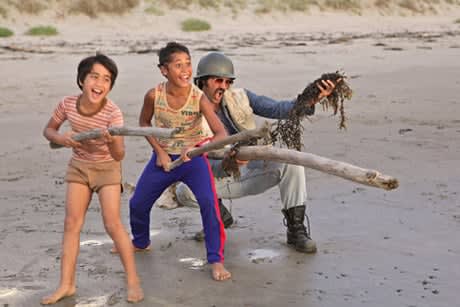The year is 1984. Boy (James Rolleston) lives in a remote rural area of New Zealand, apparently without television, yet his life is defined by pop culture. His siblings are all named for American films and shows, and he idolizes Michael Jackson.
He tries to impress the local beauty with a Moonwalk, though it ends up more like a malfunctioning robot. Soon we'll learn this pop obsession, as is the case with many children and more than a few adults, fills a hole in Boy's life.
His mother died giving birth to brother Rocky (Te Aho Aho Eketone-Whitu). Their father, Alamein (Taika Waititi, also the writer/director), is a dimwitted ex-con in a "gang" with two other local idiots who've buried a stash of loot in a field then promptly forgot its exact location. Alamein recruits Boy to dig, and dig, dozens of holes without luck. For the kid, this qualifies as bonding time.
Waititi is working with many tones, dancing between quirky humour and darker themes of neglect and abandonment. Under his watch, Boy moves from comedy to tragedy gradually. We experience Alamein's growing rage and violence with acute awareness ― a scene in which he destroys the house in frustration is all the more disturbing because, for all his faults, we've grown to like him. It is likely Boy has too, even if his vision of dad-as-Superman is getting dimmer by the day.
By the end, we can't condemn Alamein completely for not being able to raise the kids ― again, he's a bit of an idiot ― nor can we excuse Boy for holding him to an impossible standard. While Boy follows some familiar beats for a coming-of-age story, its characters are more complex and interesting than almost all others of its kind.
(Mongrel Media)He tries to impress the local beauty with a Moonwalk, though it ends up more like a malfunctioning robot. Soon we'll learn this pop obsession, as is the case with many children and more than a few adults, fills a hole in Boy's life.
His mother died giving birth to brother Rocky (Te Aho Aho Eketone-Whitu). Their father, Alamein (Taika Waititi, also the writer/director), is a dimwitted ex-con in a "gang" with two other local idiots who've buried a stash of loot in a field then promptly forgot its exact location. Alamein recruits Boy to dig, and dig, dozens of holes without luck. For the kid, this qualifies as bonding time.
Waititi is working with many tones, dancing between quirky humour and darker themes of neglect and abandonment. Under his watch, Boy moves from comedy to tragedy gradually. We experience Alamein's growing rage and violence with acute awareness ― a scene in which he destroys the house in frustration is all the more disturbing because, for all his faults, we've grown to like him. It is likely Boy has too, even if his vision of dad-as-Superman is getting dimmer by the day.
By the end, we can't condemn Alamein completely for not being able to raise the kids ― again, he's a bit of an idiot ― nor can we excuse Boy for holding him to an impossible standard. While Boy follows some familiar beats for a coming-of-age story, its characters are more complex and interesting than almost all others of its kind.
